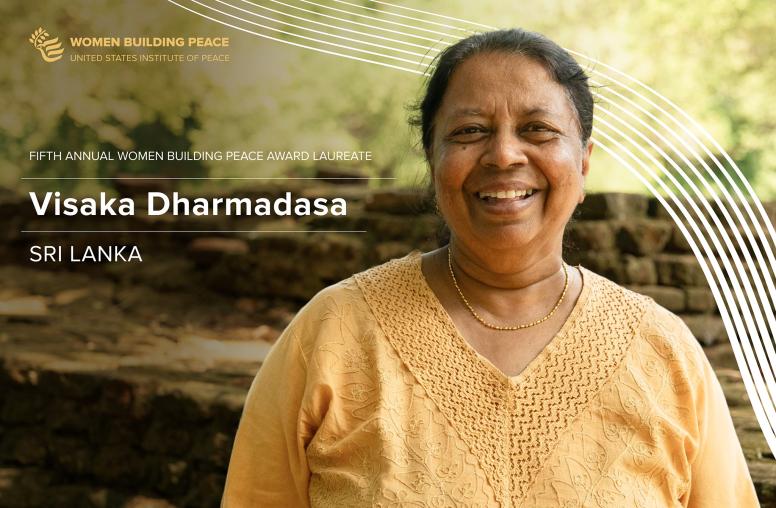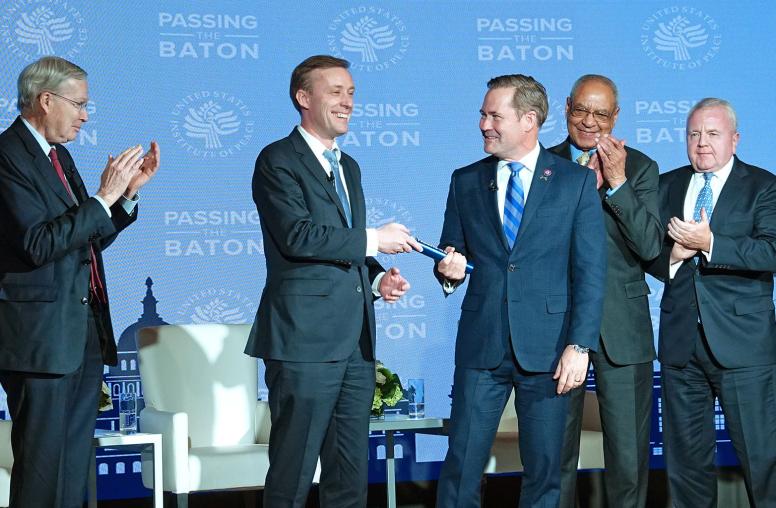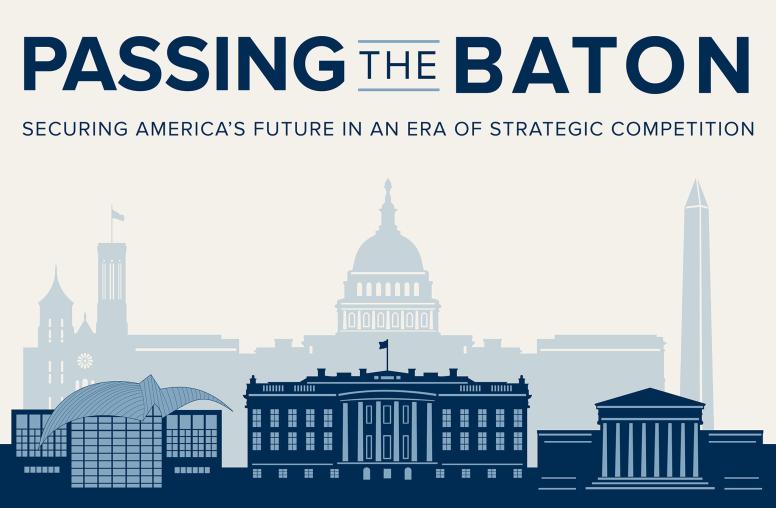Yugoslavia: An Incomplete Revolution
Institute Newsbyte explores recent events in Yugoslavia.
Although the people of Yugoslavia, in a historic show of strength and unity, have taken a momentous step towards establishing a strong and vibrant democracy, the revolution is not yet complete. What will be the priorities for the democratic opposition as Yugoslavia makes its transition from autocracy to democracy? How can the international community be supportive of these reformers in Yugoslavia?
On Thursday, October 12th, the U.S. Institute of Peace organized a special Current Issues Briefing to examine these questions and discuss the aftermath of Slobodan Milosevic's electoral defeat and the installation of Vojislav Kostunica as President of Yugoslavia. Through the use of its teleconferencing and webcasting capabilities, the Institute brought together leading experts from both Washington and within Serbia. The Briefing featured: Srdja Popovic, Serbian Otpor student resistance member and International Crisis Group correspondent Anna Husarska via telephone from Belgrade; James Hooper, Director of the Washington office of the International Crisis Group; Branko Milanovic (speaking in his personal capacity on economic issues), of the World Bank and a member of the G-17 (a private group of reform-minded Yugoslav economists); and Peter Ackerman of the Crown Capital Group and co-producer of the recently aired PBS documentary A Force More Powerful. Daniel Serwer, director of the Balkans Initiative at the U.S. Institute of Peace chaired the briefing.
The points below are major highlights and themes that emerged from the discussion. Click here for an archived copy of the audio from the Current Issues Briefing.
Milosevic is still dangerous
Although out of office and seemingly unable to recover his previous hold on power, Milosevic still has the potential to inflict damage. His supporters have a strong presence in the governments of Serbia and Yugoslavia as well as in the armed forces, police, and other security services. People who loyally served the Milosevic regime still operate within the news media, an area vulnerable to reactionary efforts by Milosevic to re-exert control. Kostunica is finding it difficult to form a Yugoslav government; and the Serbian Parliament - dominated by forces outside Kostunica's Democratic Opposition of Serbia - is resisting dissolution and elections.
The democratic opposition has not developed a united position for dealing with the Milosevic forces. The longer they wait, the more difficult it will be for them to carry out their threat to get protesters out on the street again. Delay in establishing an unequivocally democratic regime runs the risk of creating de facto cohabitation, in which Kostunica would be forced to share power with forces loyal to Milosevic.
Kostunica's priorities: asserting control, preparing for winter, breaking out of isolation
Kostunica is trying to gain control of government agencies, the police, the army, and other security services. He must do this in a legal way. This includes forming a Yugoslav government that can be approved in Parliament, dissolving the Serbian Parliament and calling elections, and ending vigilante firings in state-owned companies.
The winter poses enormous problems for Serbia, especially for its elderly, poor, and refugees. Fuel, food, and social support will be needed.
Yugoslavia is moving quickly to break out of the diplomatic isolation of the Milosevic years. The removal of sanctions will help, as will high-level visits from officials in Europe and the U.S. Entering the Council of Europe and regaining a seat at the UN will be important next steps.
Economic challenges: revenue, legal frameworks, and social support
Branko Milanovic, one of the panelists, focussed on the economic challenges facing Yugoslavia. Economic reform must be predicated on political stability. Once a Yugoslav government is formed, Yugoslavs will be taking on the rebuilding of a country that has, in the last decade, gone through many disasters: interstate and intrastate wars, years of sanctions, a fuel embargo, 700,000 refugees received from Croatia, Bosnia, and Kosovo, a bombing campaign, and most recently drought.
The effects of these events, along with years of economic mismanagement, make the task of rebuilding the Yugoslav economy daunting. While much can be left to market forces, Yugoslavia has to find government revenue (and reduce expenditures), straighten out the overlapping and contradictory legal framework acquired during the Milosevic years (including measures that sought to isolate Montenegro), and pay pensions and family allowances -- including accumulated arrears.
Particularly important to Yugoslavia will be quick emergency assistance, which is available in principle from the International Monetary Fund. The World Bank, which provides project-oriented assistance, will begin working with Yugoslavia soon, but arrears to the Bank are large and membership cannot come quickly.
The international community: finding the right balance
Kostunica's victory had a distinctly anti-American flavor, and the U.S. is not as welcome in Yugoslavia today as is Europe. Europe must therefore play a lead role, especially in public on reconstruction and also on the political front.
Some participants were concerned that Kostunica is not only a nationalist but also that he has stated four "nos": no independence for Kosovo, no independence for Montenegro, no extradition of Milosevic to The Hague, and no change in the previous regime's policy of splitting Europe from the United States. Others saw Kostunica as expressing a non-virulent form of nationalism- better termed patriotism - that does not entail racism or hatred of others.
The international community, while supporting Kostunica and the democratic revolution he leads, also needs to maintain incentives for Yugoslavia to continue moving in a democratic direction. This is a delicate balance. Yugoslavia needs early benefits from democracy, but must live up to the democratic standards.
International assistance to democratic forces in Serbia has been critical in the past year and should continue. Humanitarian assistance in preparation for winter is also essential. This should be delivered at least in part through opposition controlled municipalities.
The key policy question is whether and how to condition economic assistance. Some thought it is critical for Kostunica to demonstrate early economic benefits, so conditioning assistance on political performance would be counterproductive, denying Kostunica the means to achieve what the international community would like to see. Others thought conditionality had in the past pushed Yugoslavia in the right direction and should be maintained. James Hooper argued that delivery of at least some war criminals to The Hague should precede IMF and World Bank assistance and that U.S. bilateral assistance (beyond humanitarian and democratization efforts) should await cooperation on Dayton implementation in Bosnia and a more cooperative attitude in Kosovo.
He also noted that Russia has played an unconstructive role in the aftermath of the September 24 elections by supporting Milosevic's desire to stay in Serbia and continue in politics. He thought that Russia should pay a public price for this -- the U.S. administration should stop soft-pedaling on this issue.
Nonviolence made the revolution; nonviolence should make the peace
Srdja Popovic underlined that non-violent strategy and tactics were key to the success of the democratic opposition in Yugoslavia. A thousand activists had undergone training in these techniques which allowed the revolution to proceed almost without any casualties. They allowed the opposition to draw a distinction between themselves and the Milosevic regime, as well as gain the support of governments around the world. Nonviolence should remain a central feature of the democratic movement as it takes power. This has advantages that have been proven repeatedly around the world.
Otpor, the student-led movement that was at the center of recent events, is choosing not to become a political party in the future. Rather it will focus on educational, cultural and social issues as a nongovernmental organization. Its continuing contributions to Yugoslav civil society will be important in moving the country toward a more democratic culture.
Milosevic has to be tried: the question is where and for what
A large portion of the Serbian population opposes sending Milosevic to The Hague, mainly because they feel that they, above all others, were his primary victims. Yet while the Serbs want Milosevic tried in Serbia, at this point Kostunica does not have enough power to actually arrest Milosevic because it is not fully known which police units still remain loyal to Milosevic. Serbs will want to see Milosevic tried in Serbia for fraud and corruption committed against Serbs, not in The Hague for war crimes against others.
About the United States Institute of Peace
The United States Institute of Peace was established by Congress in 1984 as a result of a decades-long public campaign to create a national peace academy. An independent, nonpartisan, and federally funded institution, the Institute works to strengthen our national capabilities for managing and resolving international conflicts without resort to military action. Through its education, research, training and other programs the Institute endeavors to provide a resource base for policymakers, researchers, and the public to address the challenges to international peace and stability found in today's post-Cold War world. The Institute is governed in its efforts by a 15-member, bipartisan board of directors who are appointed by the President of the United States and confirmed by the Senate.
Since 1995, the Institute's Balkans Initiative has played an important role in creating a forum for discussion among government and non-government experts to assist in building consensus on key issues in the Balkans.



